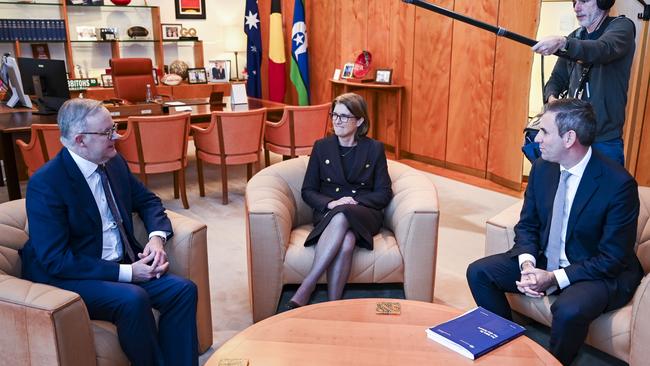Economists warn on high prices
Economists say Labor will have to win over ‘cranky’ Australians who are dealing with a cost-of-living crisis worse than either of the previous governments.

Economists including former Reserve Bank chief forecaster Luci Ellis have warned the Albanese government will have to contend with “cranky” Australians who are still feeling the sting of higher prices and a higher tax burden compared to the previous Labor and Coalition governments that were voted out.
Mr Albanese goes into the May 3 election having been boosted by a 0.25 percentage point rate cut – the first in four years – but is unlikely to get another sweetener from the central bank, with financial markets only pricing in a 13 per cent chance of another cut when it meets on Tuesday next week – the last time before the election.
As the sugar hit of an interest-rate cut fades, Mr Albanese will have to manage the effects of higher inflation and a bigger tax take than either of the preceding governments.
“The tax burden has gone up a lot and I think that is driving a lot of the frustration,” said Ms Ellis, who is now Westpac’s chief economist said.
“The rate of inflation has come down but the level of prices has not. While people are more comfortable about the labour market they are cranky about the cost of living.”
Westpac’s consumer sentiment index that measures family finances compared with a year ago has risen 17.6 per cent but is still well below the long-run average of 88 index points.
Australians will go to the polls next month facing higher inflation and a bigger tax burden under the Albanese government than they did when kicking out Kevin Rudd in 2013 or Scott Morrison in 2022.
Headline inflation reached 2.2 per cent in September 2013 when Mr Rudd lost and 1.9 per cent when Mr Morrison lost. It’s now 2.4 per cent.
Australia’s tax to GDP rate was 21.5 per cent tax in 2013, and 20.9 in May 2022 under Mr Morrison. As revealed in this week’s budget papers, the tax to GDP rate is now 23.7 per cent.
While the Rudd government received the benefit of a rate cut during the campaign in 2013, chronic leadership instability ultimately cost it the election – making it the only incumbent government to have lost an election with a rate cut during the election campaign.
Mr Albanese has been at pains to maintain leadership stability but the cost of living will be his biggest challenge.
EY chief economist Cherelle Murphy said the rate cut in February had likely made voters feel better about their situation, but that was fading and higher prices were still killing off the sense of improving financial situation.
“It’s not the inflation rate that worries voters, it’s that a supermarket trolley full of groceries that used to cost $200 is now $300 – that’s what hurts,” Ms Murphy said.
“The higher level of prices include insurance costs up 47 per cent since 2019, fuel up 27 per cent, food up 24 per cent, rents up 18 per cent and the cost of building a new home up 40 per cent.”
The challenge Mr Albanese faces is now a similar situation to the US where, despite inflation falling from a 40-year high of 9 per cent to 3 per cent, the cost of living – including a 20 per cent increase in groceries – crushed Democrat economic credentials and led to a landslide win for Donald Trump.
While this week Mr Trump is expected to impose tariffs on Australia and more broadly, Ms Murphy said that the effects of such imposts would likely not hit Australia until next year.
“The tariffs are substantial and can’t be ignored. The big effect will be indirect, and that will take some time to work through.”



To join the conversation, please log in. Don't have an account? Register
Join the conversation, you are commenting as Logout